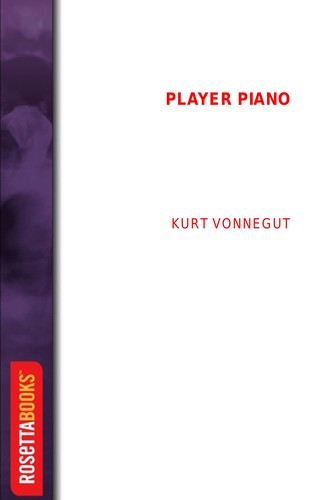eBook
English language
Published Nov. 12, 2002 by RosettaBooks.

eBook
English language
Published Nov. 12, 2002 by RosettaBooks.
Kurt Vonnegut's first novel Player Piano, published in 1952, heralded the beginning of one of the most diverting and provocative adventures in modern American fiction. Vonnegut went on to write novels that perhaps had greater formal skill and technique, but Player Piano is a tour de force of imaginative insight into modern life and a shrewd satire of American progress.What must Vonnegut's first readers have made of Player Piano? The story gives off the dank chill of 1984 and Brave New World, but it is less earnest, almost zany, and it wields its message playfully in comparison. The hero is Paul Proteus, an engineer in an America of the future where computers run everything and do everything, making people almost afterthoughts. Paul seems to be on his way up the ladder of success in this techno-utopia -- a perfect wife, a fast-track position at the Ilium Works and a shot …
Kurt Vonnegut's first novel Player Piano, published in 1952, heralded the beginning of one of the most diverting and provocative adventures in modern American fiction. Vonnegut went on to write novels that perhaps had greater formal skill and technique, but Player Piano is a tour de force of imaginative insight into modern life and a shrewd satire of American progress.What must Vonnegut's first readers have made of Player Piano? The story gives off the dank chill of 1984 and Brave New World, but it is less earnest, almost zany, and it wields its message playfully in comparison. The hero is Paul Proteus, an engineer in an America of the future where computers run everything and do everything, making people almost afterthoughts. Paul seems to be on his way up the ladder of success in this techno-utopia -- a perfect wife, a fast-track position at the Ilium Works and a shot at a major promotion -- but he is plagued with doubts about what modern life has become. Through a strange series of events (for some form of Big Brother is, indeed, watching), Paul joins a revolutionary organization called the Ghost Shirts and even becomes its leader. The Ghost Shirts are inspired by the past, when people mattered more than machines, but their revolution collapses with brutal irony. Paul and his companions surrender when they discover their followers have become obsessed with making new machines from the wreckage of the machines they have just smashed.The title of the novel smiles ruefully over what, in retrospect, looks like the most naive kind of mechanical progress -- a player piano, a machine that seems perpetually presided over by ghosts. A whole world emerges in this visionary tale, which describes much more than the fate of Paul Proteus. From the beginning, it is clear, Vonnegut delighted in devising astonishing subplots and whimsical detours from his basic story, and they never fail to stretch the reader's imagination. What is maybe most interesting about Player Piano is its scathingly clever take on the future, which looks and sounds an awful lot like the smug, "progressive" present. That quality was felt and discussed in 1952, when the novel was published. It is a measure of the depth and sensitivity of Vonnegut's imagination in Player Piano that, half a century later, the book's edge seems even sharper and its satire even funnier.